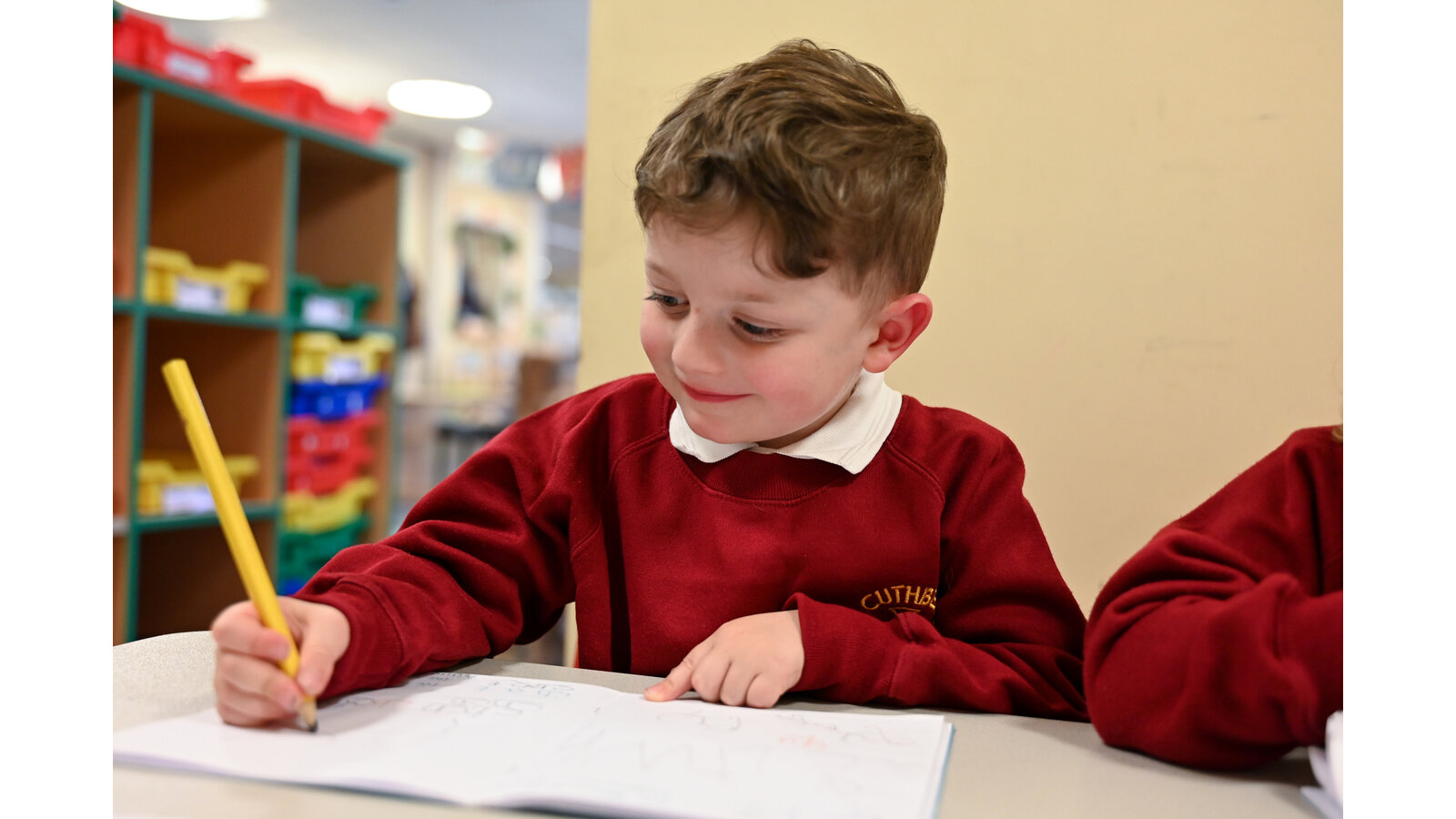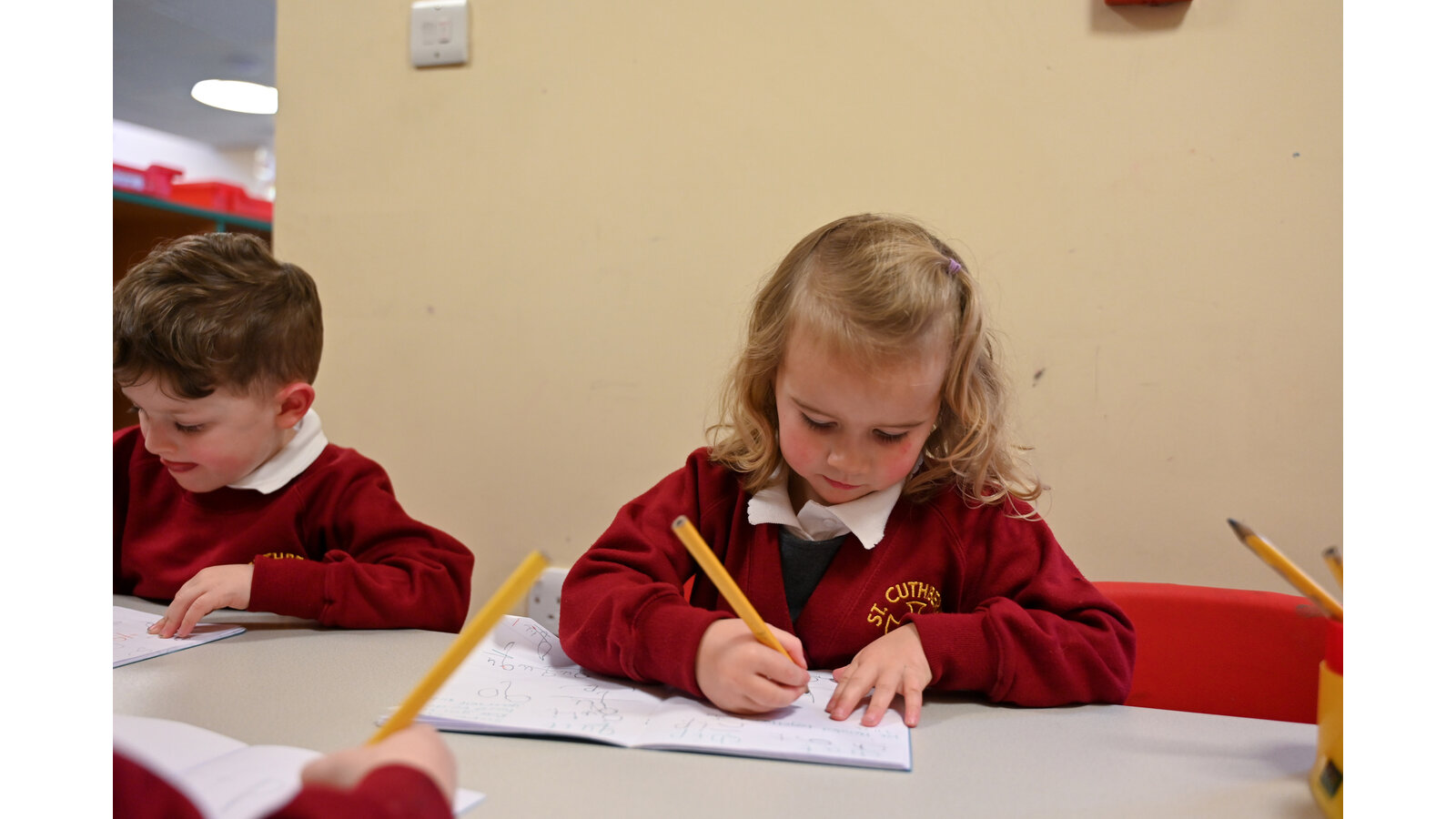English Intent
At St Cuthbert’s Catholic Primary School, we focus on accessible and adaptive teaching for all learners, developing skills, as well as offering a range of reading and writing opportunities throughout our curriculum. At St Cuthbert’s, we strive to foster a love for language that reflects our values. By providing connections to learning and inclusive activities, we aim to embed strong literacy skills. Our curriculum emphasises not only academic ability but also the ability to express and comprehend ideas with motivation and resilience. By integrating our values and diverse topics into reading and writing activities, we seek to inspire our students to become articulate communicators who contribute positively to their community and the world.
Reading Intent
We teach phonics and/or reading each day so that children can build on prior knowledge so that pupils know more and remember more. We know that children learn best by having opportunities to revisit previous learning; we provide opportunities for pupils to reflect and self-correct enabling them to develop resilience, confidence and self-belief. It is our intention to embed a reading culture and to enthuse a love and passion for reading using high-quality texts. Our goal is to ensure that every child, acquires the necessary knowledge, skills and understanding to become a confident reader.
Reading Implementation
Children at St Cuthbert’s Catholic Primary School will begin their reading journey by learning phonics using the Read Write Inc (RWI) phonics scheme, developed by Ruth Miskin. They will learn the complex skills of decoding, blending and fluency. Teaching understanding of the words being read through questioning and discussions is incorporated into the reading lessons. Lessons are taught daily and sounds are revisited during the day, intertwined with other curriculum areas. Read Write Inc is introduced in the Summer term in nursery and will continue throughout Reception and Y1. During the Autumn term, Year 2 children will continue to develop and practise their phonics skills using this scheme. The learning of phonics will continue, where necessary, as an intervention for those pupils still requiring to develop their phonics knowledge in the Spring and/or the Summer term. Any pupils who require further phonics intervention as they enter KS2 will continue to develop their phonics knowledge in specifically assigned groups. Assessment in phonics is an ongoing formative routine; online software and teacher judgment informs how children are grouped to maximise their learning opportunities. Children on the Read Write Inc scheme will take home a decodable book matched to the phonics they are working on in school, to develop fluency. They will also be given a colour band book corresponding to their reading age.
In Key Stage 2 (Y3 – Y6), reading will be taught as part of the English curriculum, using a stimulating text as a basis for written work, as well as developing reading skills. Reading skills to support understanding and a love of reading will be explicitly; reading comprehension skills are specifically taught - these can be found on class medium-term plans published on our school website. KS2 children use Accelerated Reader to ensure books are appropriate to their reading ability. Accelerated Reader provides online software that helps teachers to manage and monitor children’s independent reading practice. Children are guided to read a book at their own level and read it at their own pace. When a given book has been read, the child takes a short quiz based online. The online software generates formative data for the class teacher to monitor progress. Children take reading books home that are matched to their level on Accelerated Reader and they are encouraged to choose a variety of genres.
At the end of the day (or an alternative suitable time), a class book is shared with the children by the class teacher to support a love and interest in reading.
All children are given the opportunity to choose a library book to share with their parents.
Writing Intent
At St Cuthbert’s, our writing curriculum is designed to ensure a progressive development of skills, empowering students to become secure and proficient writers across an assortment of genres. Beginning with foundational skills in early years, we guide students through the stages of writing, emphasising creativity, coherence, and clarity. Our curriculum focuses on consistent recall and practicing of key grammar, vocabulary, and sentence structure rules. As students grow in our care, they will explore various genres throughout their curriculum topics. Our intent is to foster a love for writing, allowing every student to understand the intricacies of writing consistently and to apply these skills across diverse contexts, preparing them for future academic and personal success. Spelling, vocabulary, grammar, and handwriting are taught explicitly and intertwined into all aspects of the curriculum.
.
Writing Implementation
At St Cuthbert’s Catholic Primary School, writing is taught in terms of each genre and the unique focused punctuation, grammar and formats that are exclusive to the focus genre. Our writing progression documents shows how the children build their skills, competence, and confidence as they build upon their prior understanding throughout each child’s learning journey. This progression of skills is to assist the children to produce longer pieces of writing at least once every two weeks. At St Cuthbert’s, we also have created documents to encourage longer pieces of writing throughout the curriculum areas. RWI spelling scheme is used from Y2 – Y6, once children are secure with phonics knowledge. Y1 children learn spelling patterns linked to their phonic knowledge. Children are taught specific spelling patterns linked to the national Curriculum objectives and they are given daily practice to develop these skills. They are asked to practice spelling patterns at home and are tested weekly on the spellings set.
English Impact
St. Cuthbert's Catholic Primary School has a supportive ethos and our approaches support the children in developing their collaborative and independent English skills. Our English curriculum and high-quality teaching ensures that all children experience challenge and success in English. Regular and ongoing assessment informs teaching, as well as intervention, to support and enable the success of each child.
Assessment is carried out using the Bishop Hogarth Education Trust Steps. Year 2 and Year 6 also use the TAF statements provided by the government. Teachers integrate the use of formative assessment strategies such as effective questioning, clear learning objectives, the use of success criteria (marking ladders) and effective feedback and response in their teaching.
National Curriculum tests are used at the end of KS2; teachers use past and sample papers to inform their assessments as they prepare pupils for these assessments (Reading and SPAG). From Year 2, children complete an assessment in reading to inform reading book choices as our Accelerated Reader scheme supports. All assessments and teaching inform teachers understanding of a child’s ability in English. There is a Marking Policy used to inform high quality feedback and pupils’ responses.



